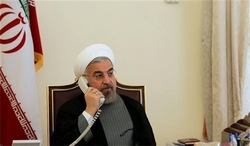 Iranian President Hassan Rouhani, in a telephone conversation with his Russian counterpart Vladimir Putin, voiced concern over the recent developments in the Syrian province of Idlib, asserting that terrorists’ control over the region was completely unacceptable.
Iranian President Hassan Rouhani, in a telephone conversation with his Russian counterpart Vladimir Putin, voiced concern over the recent developments in the Syrian province of Idlib, asserting that terrorists’ control over the region was completely unacceptable. RNA - During a telephone conversation with Putin late on Saturday, President Rouhani described the situation in Idlib as worrisome, saying that Astana peace process agreements must be implemented at earliest so that peace and security will be restored in the region.
Referring to recent developments in Idlib, Rouhani said that it is unacceptable some parts of Syria remain in the hands of terrorists for years.
"As it was on several occasions stressed that the only solution to Syrian crisis is merely political which will be resolved only through dialogue, we should not allow Idlib situation to turn into a pretext for Americans' interference and abuse of Syria," he said.
Voicing readiness for hosting trilateral meeting of Iran, Turkey and Russia's leaders, Rouhani added that very big measures in fighting terrorism have been made, the results of which should be preserved.
Iran's chief executive said that the country is fully prepared for reaching a trilateral agreement in both political and security levels on Idlib.
Elsewhere, he described bilateral relations as growing and voiced readiness for promoting cooperation in areas of mutual interest.
Appreciating Moscow's stance on the nuclear deal, officially known as the Joint Comprehensive Plan of Action (JCPOA), the Iranian president said that Tehran will abide by its commitments as long as it benefits from the deal.
Rouhani also hoped that Iran's nuclear deal will survive through cooperation of the other parties.
Putin, for his part, expressed sympathy over death of a number of Iranians due to Coronavirus, saying that Russia is ready for any cooperation to counter the contagious virus including hygienic and treatment collaboration.
Reiterating cooperation between Tehran and Moscow in the field of the JCPOA, he said that recent meeting of experts in Vienna created suitable environment for moving towards a breakthrough in this field.
Putin described agreements made within the framework of Astana peace process for solving the issue of Syria as very effective, saying that creating de-escalation zones does not mean stopping fighting terrorism.
Underling the need for maintaining Syria territorial integrity, he said that Syrian government is entitled to fight terrorists within the country.
The previous trilateral meeting of Astana Peace Process, the fifth in a row, between the presidents of the countries acting as guarantors of the Astana process to promote a peaceful settlement in Syria took place in Ankara in September 2019.
The trio also maintains contacts as part of the high-level meetings on Syria in Nur-Sultan (previously Astana), Kazakhstan. The last such meeting was held on December 10-11, 2019.
The Iranian Foreign Ministry, in a statement on Friday, voiced concern over the deterioration of the situation in the Northwestern Syrian province of Idlib, and voiced its readiness for measures to reduce tensions.
“We are carefully monitoring the field developments and regional outcomes of the developments in Idlib, and we will continue our efforts to end the current tensions,” the statement read.
The statement further highlighted the need for the sides to properly manage the situation so as to ease the fomented tensions as soon as possible.
The statement further said, the Islamic Republic of Iran, in light of the previous decision by leaders of the Astana peace process to hold the next summit in Tehran, emphasizes the continuation of its efforts to hold the summit it in the current critical situation, and believes that the summit may be a continuation to the efforts on combating terrorism, avoiding any harm to civilians and resolving political conflicts is an effective step.
The Foreign Ministry also condemned the efforts by some countries that aim to tarnish the real outcomes of the summit.
The Syrian Army’s artillery units heavily pounded the Turkish Army’s military convoy in Southern Idlib.
According to Fars News Agency, the Turkish Army’s military convoy came under the Syrian Army’s artillery fire on al-Bareh-Kansafreh road in Southern Idlib.
The Arabic-language media outlets reported that a Turkish Army combat tank was targeted and destroyed. There are no reports on the possible casualties of the Turkish Army.
In a relevant development on February 19, the Turkish Army had sent around 300 military vehicles to its observation points in the Syrian province of Idlib.
According to Haberturk broadcaster, the military trucks, armored vehicles, and self-propelled guns are heading to the de-escalation zone, Haberturk reported.
This deployment comes after Ankara performed strikes against the Syrian Arab Army (SAA), claiming that Damascus violated a ceasefire after several Turkish servicemen died during the army's attack at the observation point in Idlib.
The Syrian government, however, stated that the various armed factions in Idlib – the last stronghold of jihadists in the country – ignored the agreement, repeatedly attacking the military.
According to Damascus, there are at least 70,000 militants in the rebel-controlled part of the province, with many of them belonging to the al-Nusra terrorist organization.
President Recep Tayyip Erdogan vowed to drive the Syrian forces from the de-escalation zone before the end of February, also threatening to launch a full-scale military offensive in all areas if Damascus attacks the Turkish Army.
847/940